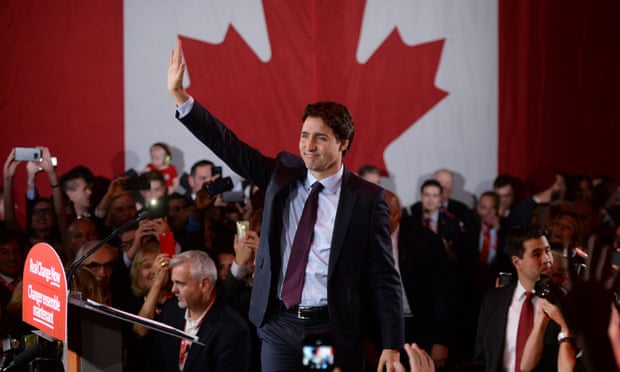CANADA ELECTS TRUDEAU

Today is a historic day for Canada, ourselves, and the world. Yes, the release of the new Star Wars trailer will most certainly be marked in history second only to the release of the movie itself. However, a “secondary” piece of news occurred yesterday which does demand a bit of attention, at least until 18 December 2015. As it turns out, Canada has a new Prime Minister.
Apparently, while I was busy prepping for Star Wars, and watching the Blue Jays in the playoffs, Canada decided to elect Trudeau as our new PM. No, this isn’t the 1980s. In fact, if my calculations are correct, Marty McFly should be arriving here any second now. If and when he arrives, he will find a Canada radically changed from a day ago.
This was one heck of an election. After nine years of Stephen Harper’s Conservative government, four as a majority, Canadians decided the time was ripe for a change, and ushered in Justin Trudeau’s Liberals to their first majority government in fifteen years. Following a down year in 2011, where only 61.1 percent of eligible voters cast a ballot, Canada rebounded to an estimated 68.5 percent turnout for the 2015 election. Of course, for a country that used to consistently see 75 to 80 percent of the population vote in each election, the numbers remain disappointing. That being said, it is absolutely a step in the right direction.
Of the ballots cast, Justin and Stephen traded percentages of the popular vote as compared to the last election. This time, it was Justin capturing 39.5 percent of the popular vote, with Stephen pulling in 31.9 percent. Interestingly, this election represented more of a surge for the Liberals, and a collapse for the NDP, than a significant change for the Conservatives.
The Conservatives lost only -0.97 percent of their 2011 vote total, while the NDP lost -27.85 percent of their voters, and the Liberals saw a stunning 59.66 percent
increase in support. The Bloc Quebecois get the award for oddest election result, as their 80,000 fewer votes somehow landed them an increase from four seats in the House of Commons to ten. Elizabeth May kept her
seat, winning her riding in the Saanich-Gulf Islands.
The results show that the Liberals have recaptured the bulk of left-leaning Canadians, and the attention of undecided voters. Thanks to our, hopefully soon to change, electoral system, the Liberals rode the win to 87 seat gains from the Conservatives, 56 from the NDP, and 1 from the BQ. With 184 total seats as compared to the Conservatives’ 99, the NDP’s 44, the
BQ’s 10, and the Green’s 1, the Liberals are poised to form a powerful majority government.
Of that new government, Canada will see a marginal change in the number of women representatives, up from 76 to 88. LGBTQ Representation and Rights, a research group in the United States, counts 6 LGBTQ
and out candidates who won their riding, the same number as the three previous elections. 10 indigenous candidates were also elected, representing an increase over the 7 who won in 2011.
With the election behind us, our attention now turns to ensuring accountability and productivity from our new government. Trudeau has made significant promises regarding electoral and senate
reform, criminal reform, new approaches to immigration and indigenous rights, and changes to tax and CPP rates. These plans could have positive or detrimental effects on the country, and it will be the
responsibility of all Canadians to monitor and respond to the changes as appropriate.
Our other responsibility will be in bringing to the forefront less “fashionable” public concerns. Trudeau plans to stop bombing campaigns in Syria, but the
US has already shown how ineffective “training missions” can be, and Trudeau is formulating similar plans. Climate change is back in the Canadian psyche, but efforts will mean little in the face of increased oil
drilling (Shell starts exploratory drilling this week off the east coast) and a lack of international cooperation. Canada’s tax system remains grossly skewed in favour of the wealthy regardless of proposed changes, and individual rights to housing and food remain distant dreams.
Further, though many prefer to ignore the impending reality, our evolving economy is also on the verge of permanently changing the country. Automation and globalization are combining to craft a
new labour market, for which our politicians will have no choice but to respond. Income inequality is hitting a crux, and poverty is increasingly driving migration, crime, and civil unrest across and over international borders. The times, they are a’ changin,’ and it’s anyone’s guess how far things will go during our next government’s tenure. Fortunately, by showing the power of our voices in this election, Canadians have positioned themselves well to address future challenges, and seize opportunities. For Justin Trudeau, the opportunity is now, and with a majority government, and the confidence of Canadians behind him, substantial progress is hopefully just around the corner.
